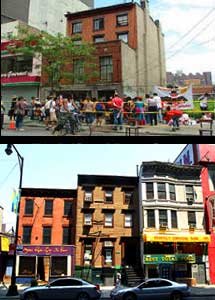 What planet does the NYC Economic Development Corporation live on, thinking that it is worth destroying the Duffield Abolitionist homes to build a parking lot?
What planet does the NYC Economic Development Corporation live on, thinking that it is worth destroying the Duffield Abolitionist homes to build a parking lot?Norman Oder's Atlantic Yards Report addresses this question today:
Sociologist Robert Fitch's bracing 1993 book (updated 2002), The Assassination of New York, considers Robert Moses far less responsible for urban outcomes in the city than the FIRE (Fire Insurance Real Estate) elite, notably the Rockefeller family, expressing its wishes through the work of the Regional Plan Association.The posting touches upon several issues related to the EDC's plan to confiscate private property for the sake of economic development, but Mr. Oder does address the Downtown Brooklyn plan once directly:
[T]he issue is also the way incentives shape markets; why, for example, has Downtown Brooklyn become a home for housing, when that was not anticipated in the Downtown Brooklyn rezoning? Because tax breaks make the projects that much more attractive.And in an aside describing the EDC, the Arts Commission, and how many projects are interrelated:
[Note: the Public Development Corporation, headed by Jim Stuckey before he went to Forest City Ratner, is now the New York City Economic Development Corporation and the Urban Development Corporation is now the Empire State Development Corporation. Both are Atlantic Yards backers.]The decisions of the EDC strike me as arbitrary. Fitch's book seems to describe a process that is conspiratorial (I haven't read the book, so I can't say whether he's right or wrong):
Fitch continues:The parking lot that the EDC wants to build in place of the Duffield Street properties would function almost as a private parking lot for the new hotels being built across the street. It is conceivable that the destruction of the Abolitionist homes is purely a gift for these hotels.
New York's City Planning Commission bears no resemblance to Tokyo's MITI. It has none of Daniel Burnham's soaring spirit. City Planning makes no plans--big or little. The master plan for New York that was the stated reason for creating the Commission has never materialized. Its role is to validate and legalize the plans and initiatives conceived by the city's private real estate interests.
(Emphasis added)
You can't say that's true today, if you consider City Planning's responsiveness to some neighborhood requests for downzoning and contextual zoning. But what was City Planning's letter regarding Atlantic Yards but a validation of a plan privately presented to it months earlier?
